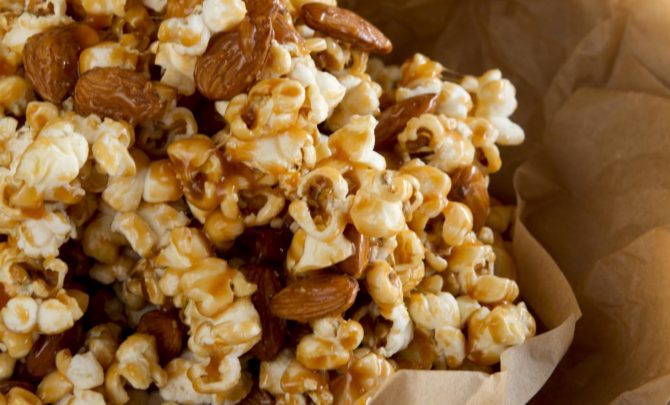Eating a bowl full of crunchy popcorn is loved by many people. For centuries, it’s been considered a favorite snack item in the USA. Do you have a craving for a big pack of popcorn while you go to watch movies at a theatre? Or while watching late night flicks at home on your DVD player with your partner? But is eating popcorn healthy?

Is Popcorn Healthy?
The answer to this question is a “Yes”, if you exclude the commercially available popcorn.
Popcorn Is Even Healthier Than Vegetables and Fruits
According to a study, one portion of air-popped popcorn has greater amounts of antioxidants than those present in all the vegetables and fruits most people eat in a single day. Antioxidants are compounds that help fight free radicals which cause cellular damage.
Popcorn is also a rich source of vitamins such as folate, riboflavin, niacin, vitamins A, B, K and E, thiamine and minerals such as zinc, potassium and iron. It also contains polyphenols which again contain antioxidants to fight off heart problems and cancers.
Additionally, one cup or 25 g of air popped popcorn has only 31 calories and 0.3 g of fats. However, if the corn is popped in oil, the values mentioned above can become triple, but in comparison to the same portion of salted fried crisps, popcorn is certainly a better option.
Popcorn Is a Dieter's Food
Is popcorn healthy? Yes. If you are on dieting and trying to lose a few pounds, you may be bothered by hunger pangs. Popcorn is a light and filling food to stop those annoying hunger pangs and also provides a boost to your health at the same time.
This is partly due to its low GI (glycemic index). The beneficial GI of popcorn has been highlighted by USDA (United States Department of Agriculture). Glycemic index is a term that describes the levels of blood sugar after consumption of carbohydrates-containing foods. Foods that have a low GI are recommended as they won’t increase the blood sugar after consumption and make you feel fuller for a longer duration. Popcorn has a GI of 55, which is quite low in comparison to 2 slices of white bread that have a GI of 88, hence, making eating small portions of popcorn an excellent method for weight management.
Popcorn Is Rich in Dietary Fiber
Is popcorn healthy? Yes. Whole grains provide a major benefit of dietary fiber. Popcorn contains around 4 g of dietary fiber in every 4 cups of air-popped corn. Majority of the Americans consume half amount of their recommended daily intake (RDI) of fiber. The RDI of fiber is 25 g for females and 38 g for males. An adequate intake of fiber not only keeps your bowel movements regular but also reduces your risk of heart disease, levels of blood cholesterol and your risk of developing type 2 diabetes.
All Types of Popcorn Are Not Equal
While natural, plain popcorn has many health benefits, due to convenience and taste, various unhealthy extras have been added to the regular popcorn.
- Microwave popcorn is full of unhealthy oils and other additives that make it packed with a lot more calories.
- Caramel corn and kettle corn have large amounts of sugar.
- Cheddar and other types of flavored popcorn have unhealthy fats, artificial flavorings and other additives.
How to Make Healthier Popcorn
After answering the question "is popcorn healthy?" let’s discuss some ways to make healthier popcorn.
- Pop your popcorn using an air popper: Prepare popcorn using an air popper. You don’t need to add any salt, sugar or fat in this method. One such machine is available under $20. You can also buy air popped popcorn from your local grocery store. Just make sure that it doesn’t contain any added ingredients.
- Use small quantity of oils: A healthy choice is to use coconut oil. It also adds a subtle, tasty flavor of coconut to your corn. Heat 3/2 tbsp. of coconut oil in a heavy bottom pan over medium high heat. Add ½ cup of corn kernels.
- Go for organic: If you are making popcorn at home, go for organic popping. The organically grown kernels will not contain any pesticides or other toxic substances. There is not much difference between the price of organic and nonorganic variety.
- Use different types of toppings: There are many different types of toppings that you can try to flavor your popcorn apart from butter. For a nutty flavor, sprinkle some yeast; for a little spicy flavor, sprinkle some cayenne pepper; for some sweet flavor, sprinkle some cinnamon or cocoa powder; or if you want something savory, sprinkle old bay seasoning.
- Add some vegetables to your corn: You can try making kale popcorn. You have to bake the kale till it’s crispy. Make a powder of the baked kale. Then pop the kernels in some olive oil and mix the kale powder. The same recipe can be tried with spinach, Brussel sprouts or any other leafy vegetables.
- Watch your portion size: Though popcorn has lesser calories, still you need to watch your portion size. Instead of snacking on an entire bag of corn, pour some into a bowl or measure using a cup before snacking.
Healthy Almond Vanilla Popcorn Recipe

Ingredients
- 1/2 cup popcorn kernels (organic)
- 2 tbsp. coconut oil
- 2 tbsp. vanilla extract
- 1 tbsp. water
- 1 tbsp. almonds
- 2 Medjool dates
Instructions
- Set the oven to 325 degrees. Pop the kernels using an air popper.
- Combine the dates, coconut oil, vanilla extract, water and almonds in a blender jar. Blend until smooth paste is formed.
- Take a large bowl and mix the sauce with the popcorn. Place in a large roasting tray and bake for approximately 8-10 minutes. Keep stirring in between. The popcorn is ready when all the pieces are not soggy.
- After cooling on a wire rack, store the popcorn in an air-tight box.